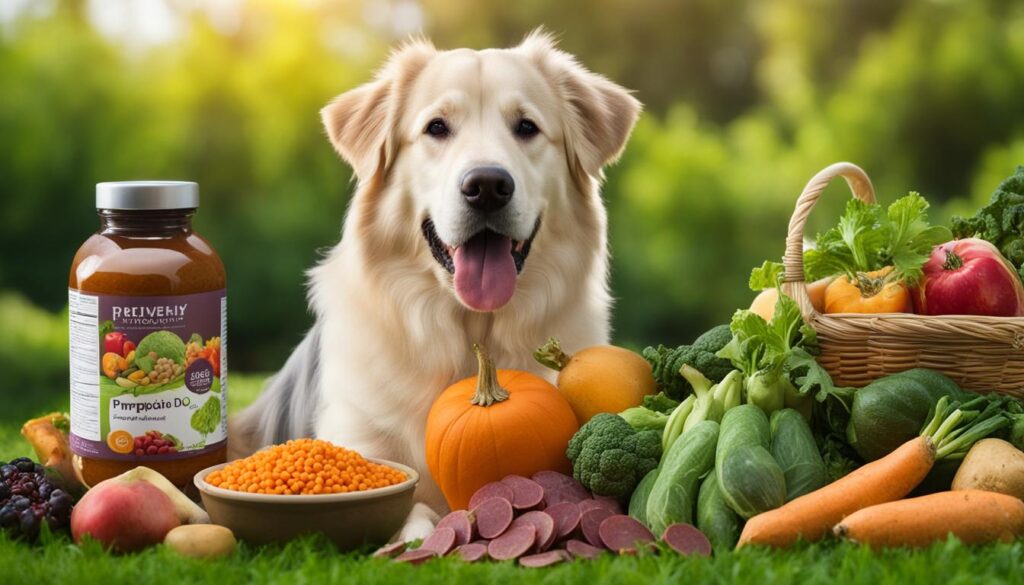Are you looking for ways to enhance your furry friend’s health and well-being? Look no further! The secret lies in incorporating prebiotics and probiotics into your dog’s diet. These powerful dietary components have been proven to support canine gut health and promote overall wellness. So, let’s dive into the world of prebiotic and probiotic enriched diets for our beloved pups!
Probiotics, prebiotics, and postbiotics are essential for maintaining the health and well-being of dogs. Probiotics are live microorganisms that help balance the gut microbiome, while prebiotics are indigestible fibers that serve as food for the beneficial bacteria in the gut. Including these components in a dog’s diet can improve gut health, enhance nutrient absorption, and support overall wellness.
Key Takeaways:
- Adding prebiotics and probiotics to your dog’s diet can improve gut health and overall well-being.
- Probiotics are live microorganisms that help balance the gut microbiome.
- Prebiotics are indigestible fibers that serve as food for beneficial bacteria in the gut.
- Including prebiotic-rich foods and probiotic supplements can support your dog’s gut health.
- Choosing high-quality probiotic dog food brands can ensure your dog receives viable and live microorganisms.
Understanding Postbiotics: The Superpower in Fermented Foods
Fermented foods have gained popularity for their numerous health benefits, and they are not just beneficial for humans but also for our canine companions. One of the key components of fermented foods that contribute to their health-promoting properties is postbiotics. Postbiotics are the compounds produced when microorganisms digest prebiotics, and they have been found to have profound effects on digestive health and overall well-being in dogs.
Postbiotics encompass a wide range of beneficial compounds, including short-chain fatty acids, peptides, enzymes, amino acids, vitamins, and neurotransmitters. These compounds play crucial roles in supporting dogs’ digestive health by aiding nutrient absorption, reducing inflammation, and strengthening the immune system. Moreover, postbiotics derived from fermentation can contribute to healthy skin, protect against food allergens, lower blood sugar levels, and even improve insulin sensitivity, which can be particularly beneficial for dogs with diabetes.
When it comes to incorporating postbiotics into a dog’s diet, fermented foods are an excellent source. Yogurt, kefir, sauerkraut, and miso are some examples of fermented foods that contain postbiotics. These foods undergo a fermentation process where live bacteria produce the beneficial compounds. By including fermented foods in a dog’s diet, pet owners can support their canine companion’s gut health and overall well-being.

The Benefits of Postbiotics:
- Enhanced digestion and nutrient absorption
- Reduced inflammation and improved immune function
- Healthy skin and protection against food allergens
- Lowered blood sugar levels and improved insulin sensitivity
By incorporating fermented foods rich in postbiotics into your dog’s diet, you can provide them with a natural and effective way to support their digestive health and overall wellness. However, it’s important to note that not all dogs can tolerate fermented dairy products due to lactose intolerance. In such cases, opt for unsalted sauerkraut or other fermented foods that are safe for dogs. As always, consult with your veterinarian before making any significant changes to your dog’s diet.
The Importance of Probiotics and Prebiotics in Canine Gut Health
Ensuring your dog’s gut health is crucial for their overall well-being. Probiotics and prebiotics play a vital role in maintaining a healthy balance of gut flora, which is essential for proper digestion, nutrient absorption, and a strong immune system. Incorporating these beneficial microorganisms into your dog’s diet can be done through supplements or natural sources like yogurt and kefir.
Probiotics are live microorganisms that help balance the gut microbiome by inhibiting the growth of harmful bacteria and promoting the growth of beneficial bacteria. Including probiotic supplements in your dog’s diet can provide a concentrated dose of these beneficial microbes. Natural sources of probiotics, such as yogurt and kefir, can also be incorporated into your dog’s meals as a tasty and nutritious addition.
The Benefits of Probiotics for Dogs:
- Improved digestion and nutrient absorption
- Reduced inflammation in the gut
- Stronger immune system
- Prevention of leaky gut syndrome
- Protection against food allergens
Prebiotics, on the other hand, are indigestible fibers that serve as food for the beneficial bacteria in the gut. Including prebiotic-rich foods in your dog’s diet can support the growth of these beneficial bacteria and promote a healthy balance of gut flora. Chicory root, mushrooms, and garlic are examples of prebiotic-rich foods that can be added to your dog’s meals.
For those who prefer homemade options, you can make probiotic dog treats using ingredients like plain yogurt, pumpkin puree, and ground flaxseed. These treats can provide your dog with the benefits of probiotics while also being a delicious and healthy snack. Just be sure to check with your veterinarian before introducing any new foods into your dog’s diet.
The Importance of Balancing Dog Gut Flora:
By prioritizing probiotics and prebiotics in your dog’s diet, you can help maintain a healthy balance of gut flora, which is essential for their overall gut health. A balanced gut microbiome promotes digestion, nutrient absorption, and a strong immune system, while also protecting against digestive issues and other health problems. Taking care of your dog’s gut health can lead to a happier, healthier companion.
| Probiotics | Prebiotics |
|---|---|
| Live microorganisms that help balance the gut microbiome | Indigestible fibers that serve as food for beneficial bacteria |
| Aid digestion and nutrient absorption | Promote a healthy balance of gut flora |
| Boost the immune system | Support the growth of beneficial bacteria |
| Reduce inflammation in the gut | Improve overall gut health |
With the importance of probiotics and prebiotics in canine gut health, it’s essential to prioritize these components in your dog’s diet. Whether through probiotic supplements, natural sources like yogurt, or homemade probiotic dog treats, taking care of your dog’s gut health can contribute to a happier and healthier life.
Dog Diets with Natural Prebiotics: Promoting Digestive Health and Wellness
Ensuring the digestive health of your dog is essential for their overall well-being. One effective way to support their digestive system is by incorporating natural prebiotics into their diet. Prebiotics are indigestible fibers that serve as food sources for the beneficial bacteria in the gut, promoting their growth and suppressing the growth of harmful microbes.
There are several natural foods that contain prebiotics and can be easily included in your dog’s diet. For example, fruits and vegetables like Jerusalem artichokes, chicory root, raw garlic, dandelion greens, and mushrooms are rich sources of prebiotic fibers. Incorporating these foods into your dog’s meals can help support their digestive health, improve nutrient absorption, and strengthen their immune system.
Quote: “Including prebiotic-rich foods in your dog’s diet can provide them with the necessary fibers to support their gut health and overall wellness.” – Dog Health Expert
In addition to natural food sources, prebiotic supplements can also be used to ensure that your dog is receiving an adequate amount of these beneficial fibers. These supplements are specifically formulated to provide the right balance of prebiotics to support your dog’s gut health. Consult with your veterinarian to determine the appropriate dosage and frequency of prebiotic supplements for your dog.
The Benefits of Dog Diets with Natural Prebiotics:
- Promotes the growth of beneficial bacteria in the gut
- Suppresses the growth of harmful microbes
- Supports digestive health and nutrient absorption
- Strengthens the immune system

| Prebiotic Food Sources | Benefits |
|---|---|
| Jerusalem Artichokes | High in inulin, supports the growth of beneficial bacteria |
| Chicory Root | Rich in inulin, promotes digestive health |
| Raw Garlic | Contains prebiotic fibers that support gut health |
| Dandelion Greens | Provides prebiotic fibers and antioxidants |
| Mushrooms | Rich in prebiotic fibers and beneficial nutrients |
Choosing the Right Probiotic Supplement for Dogs
When it comes to ensuring the health and well-being of your furry friend, choosing the right probiotic supplement is crucial. Probiotics are live microorganisms that can provide a range of health benefits for dogs, including improved digestion, strengthened immune system, and enhanced nutrient absorption. However, not all probiotic supplements are created equal. It’s important to select a high-quality product that contains viable, live microorganisms to ensure maximum effectiveness.

Many commercial dog foods claim to contain probiotics, but the processing involved in manufacturing these products often kills off the beneficial bacteria. Therefore, it’s recommended to choose a probiotic supplement specifically designed for dogs. These supplements are formulated to withstand the processing and storage conditions and are more likely to contain viable probiotic strains that can thrive in your dog’s digestive system.
Top Probiotic Dog Food Brands
When selecting a probiotic supplement for your dog, it can be helpful to consider reputable dog food brands that offer probiotic-enriched diets. These brands often prioritize the inclusion of high-quality probiotics in their products, ensuring the maximum benefits for your dog’s gut health. Some top probiotic dog food brands include:
| Brand | Key Features |
|---|---|
| Brand 1 | – Contains a blend of probiotic strains for optimal gut health – Made with high-quality ingredients to support overall wellness |
| Brand 2 | – Provides a specific probiotic strain known for its digestive benefits – Formulated to meet the nutritional needs of dogs |
| Brand 3 | – Offers a variety of flavors and formulas to suit different dietary preferences – Includes prebiotics for additional gut health support |
By choosing a probiotic supplement from a trusted brand, you can have peace of mind knowing that you are providing your dog with a high-quality product that can support their gut health and overall well-being.
Incorporating Fermented Foods into Your Dog’s Diet
Fermented foods can be a valuable addition to your dog’s diet, offering numerous benefits for their gut health and overall well-being. These foods contain live bacteria that contribute to a healthy gut microbiome, and they undergo a fermentation process that produces beneficial compounds like enzymes, vitamins, and short-chain fatty acids. By incorporating fermented foods into your dog’s diet, you can enhance their digestive health and support their immune function.
Some popular fermented foods suitable for dogs include yogurt, kefir, sauerkraut, and miso. These foods are rich in probiotics, which are live bacteria that promote the growth of beneficial microorganisms in the gut. Probiotics can aid in digestion, reduce inflammation, and support a healthy immune system. It’s important to note that not all dogs can tolerate fermented dairy products due to lactose intolerance, so unsalted sauerkraut can be a suitable alternative.
Benefits of Incorporating Fermented Foods:
- Improved digestion
- Enhanced immune function
- Reduced inflammation
- Support for a healthy gut microbiome
When introducing fermented foods to your dog’s diet, it’s essential to avoid artificial sweeteners, as they can be toxic to dogs. Start by incorporating small amounts of fermented foods gradually to allow your dog’s digestive system to adjust. Monitoring your dog’s response is important, and if any adverse reactions occur, discontinue feeding them fermented foods and consult with your veterinarian.
Enhancing Canine Gut Health with Probiotics and Prebiotics
Probiotics and prebiotics offer numerous benefits for dogs’ overall well-being, specifically in enhancing their gut health. These supplements work together to promote the growth of beneficial bacteria in the gut while suppressing the growth of harmful microbes. By incorporating probiotic supplements or including prebiotic-rich foods in your dog’s diet, you can support their digestive health, improve nutrient absorption, and strengthen their immune system.
Probiotics, which are live microorganisms, help balance the gut microbiome by inhibiting harmful bacteria and promoting the growth of beneficial ones. They can be offered to your furry friend through supplements or natural sources like yogurt and kefir. Prebiotics, on the other hand, are indigestible fibers that act as food for the beneficial bacteria in the gut. Foods like chicory root, mushrooms, and garlic contain prebiotics and can help support the growth of these beneficial bacteria.
“Probiotics and prebiotics work together to promote the growth of beneficial bacteria in the gut and suppress the growth of harmful bacteria, contributing to a healthy balance of gut flora.”
Prebiotic and Probiotic Combination in Dog Food
To ensure your dog receives the benefits of both probiotics and prebiotics, consider incorporating dog food brands that offer a combination of these supplements. These specially formulated diets provide a convenient and balanced approach to support your dog’s gut health. Look for reputable brands that use high-quality ingredients and include specific probiotic strains known for their efficacy in dogs.
In addition to commercial dog food, you can also prepare homemade probiotic dog treats using natural ingredients. This allows you to have full control over the ingredients and ensure your dog is receiving beneficial microorganisms. When preparing homemade treats, make sure to use ingredients that are safe for dogs and avoid any potential allergens.
By prioritizing your dog’s gut health and incorporating probiotics and prebiotics into their diet, you can contribute to their overall well-being and ensure they have a strong foundation for optimal health.
Conclusion
Incorporating probiotics and prebiotics into your dog’s diet is a smart move to enhance their gut health and overall well-being. The benefits of these beneficial microorganisms are numerous, including improved digestion, enhanced nutrient absorption, reduced inflammation, and a strengthened immune system. By prioritizing gut health, you can ensure that your canine companion is happy and healthy.
One way to provide probiotics and prebiotics to your dog is through probiotic dog food brands. These brands offer specially formulated diets that are enriched with the essential microorganisms your dog needs. Alternatively, you can choose to make homemade probiotic dog treats, providing a natural and tasty way to incorporate these beneficial elements into your dog’s diet.
Remember, a healthy gut is the key to a healthier dog. So whether you opt for probiotic dog food brands or homemade treats, the goal remains the same – to enhance your dog’s gut health and support their overall wellness. So go ahead, give your furry friend the gift of a healthy gut!
FAQ
Are probiotics, prebiotics, and postbiotics important for my dog’s health?
Yes, probiotics, prebiotics, and postbiotics are essential for maintaining the health and well-being of dogs. They provide numerous benefits, including aiding digestion, reducing inflammation, boosting the immune system, and supporting healthy skin.
Where can I find probiotics for my dog?
Probiotics can be found in foods like yogurt and kefir. There are also probiotic supplements available specifically designed for dogs.
What are prebiotics and how do they support gut health in dogs?
Prebiotics are indigestible fibers that serve as food for the beneficial bacteria in the gut. Including prebiotic-rich foods like chicory root, mushrooms, and garlic in a dog’s diet can support the growth of these beneficial bacteria and promote a healthy balance of gut flora.
How can I incorporate probiotics and prebiotics into my dog’s diet?
You can include probiotics in your dog’s diet through supplements or natural sources like yogurt and kefir. Prebiotics can be obtained by including prebiotic-rich foods or using prebiotic supplements in your dog’s diet.
How do postbiotics benefit my dog’s gut health?
Postbiotics, which are byproducts of the fermentation process, have numerous health benefits. They help the digestive tract absorb nutrients, reduce inflammation, boost the immune system, support healthy skin, and protect against food allergens.
Can I give my dog fermented foods?
Yes, fermented foods like yogurt, kefir, sauerkraut, and miso can be a valuable addition to your dog’s diet as they provide both probiotics and postbiotics. However, not all dogs can tolerate fermented dairy products, so unsalted sauerkraut can be a suitable alternative.
How do probiotics and prebiotics work together for canine gut health?
Probiotics help balance the gut microbiome by inhibiting the growth of harmful bacteria and promoting the growth of beneficial bacteria. Prebiotics serve as food for the beneficial bacteria, supporting their growth and promoting a healthy balance of gut flora.
Can probiotics and prebiotics improve my dog’s overall well-being?
Yes, including probiotics and prebiotics in your dog’s diet can improve gut health, enhance nutrient absorption, reduce inflammation, strengthen the immune system, and support overall wellness.





